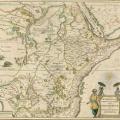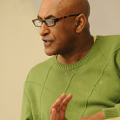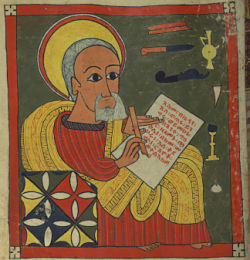10. Think for Yourself: Walda Heywat
Walda Heywat’s reaction to the thought of his teacher Zera Yacob, and the dispute over the authenticity of these two Ethiopian philosophers.
Themes:
• R. Lee with M. Worku and W.L. Belcher, The Hatata Enquiries: Two Texts of Seventeenth-Century African Philosophy from Ethiopia about Reason, the Creator, and Our Ethical Responsibilities (Berlin: 2023).
• C. Conti Rossini, “Lo Ḥatatā Zar’a Yā‘qob e il padre Giusto da Urbino,” Rendiconti della Reale Accademia dei Lincei 29, ser. 5 (1920), 213-23.
• Galawdewos, The Life and Struggles of Our Mother Walatta Petros: A Seventeenth Century African Biography of an Ethiopian Woman, ed., trans. W. Belcher and M. Kleiner (Princeton: 2015).
• G. Haile, “The Discourse of Wärqe, Commonly Known as Ḥatäta zä-Zärʾa Yaʿǝqob,” in G. Haile, Ethiopian Studies in Honour of Amha Asfaw (New York: 2017), 51-71.
• E. Mittwoch, Die amharische Version der Soirées de Carthage mit einer Einleitung : Die angeblichen abessinischen Philosophen des 17. Jahrhunderts (Berlin: 1934).
• C. Sumner, The Treatise of Zärʾa Yaʿǝqob and of Wäldä Ḥǝywat: Text and Authorship, (Addis Ababa: 1976).
• A. Wion, "The History of a Genuine Fake Philosophical Treatise (Ḥatatā Zar’a Yā‘eqob and Ḥatatā Walda Ḥeywat)" in three parts on the online journal Afriques: introduction, part 1, part 2.
Online article on “The African Enlightenment” by Dag Herbjørnsrud







Comments
Forgeries
Over the three episodes on Zar’a Yā‘eqob and Walda Ḥeywat, the opinion of yourself and Tedros seems to be firm in that the works are genuine. Personally I think it would be a mistake to underestimate the skills of forgers. Hans ven Meegren's forgeries of Vermeer were only discovered after he was accused of selling genuine Vermeers to the Nazis. An accusation of treason which could have been punished by the death penalty. He had to paint a new "Vermeer" over five months in prison to proove he had forged them. Prior to that, the art experts were entirely convinced they were Vermeers.
There have been other forgeries. The Hitler Diaries which were signed off as genuine by Hugh Trevor-Roper. At the time a respected historian. Not as respected afterwards. A lot of people in the 18th century went wild over the romantic poet Ossian. Thomas Jefferson said, “I am not ashamed to own that I think this rude bard of the North the greatest poet that has ever existed”.
Then there is the case of religion. If someone doesn't beleive, like myself, any religous work of "revelation" has a good chance of being a forgery. Is there anyone outside of the Mormon church who believes Joseph Smith's works are anything other than forgeries?
There will be undiscovered forgeries. It might be said that a famous forger is a bad forger. Unless they were caught by circumstance, like Van Meegeren.
In the case of Zar’a Yā‘eqob and Walda Ḥeywat I have no dog in the fight. Other than your podcasts and a little reading online, I know nothing about it. There seem to be scholars on both sides. Just want to make the point that sometimes people want to believe so much that it can hamper their judgment and that we shouldn't underestimate the skills of forgers. Just as a general principle, not specific to this case.
If Giusto d’Urbino did forge these works, I could only speculate on what his motivation was. But it wouldn't take much effort to come up with a story.
What I find most interesting about this, is that it seems to be an example of where philosophy and the history of philosophy come apart. If in the works of Zar’a Yā‘eqob and Walda Ḥeywat there are exciting and original ideas that still speak to us today, as someone interested in philosophy, I could say in an unqualified way, great! Why care about who wrote them? The ideas are what matter. For you as a historian of philosophy, placing them in their proper context, giving appropriate credit and assessing how these works reflect on other contemporary works from the culture, I would assume is fundamental. If they were shown to be forgeries, I also assume as a historian you would not say great!
The same could be said of other forgeries. If the poetry of Ossian was powerful, moving and touched many people, does it matter if the Ossian persona was a forgery? The poetry itself is still the same.
In 1990 a new Carravagio was discovered, The Taking of Christ. Lots of people think it's masterpeice. Looks that way to me. If it was discovered to be a forgery, why should people not continue to think that it's a masterpiece?
To finish, I throughly enjoyed these three episodes, thought provoking, glad you make the podcast :)
In reply to Forgeries by 5 December 2023
Forgeries
Yes, very well taken points. Since we made these podcasts (in fact, just last week!) a new English translation of the Hatata appeared and it has a long introduction with an interesting discussion of the authenticity debate. The scholarly consensus seems to be drifting toward the idea that it is either authentic or has an authentic core, but it is a complicated question and to be honest I am in the end agnostic because I think one would need to master Ge'ez and look at the manuscripts oneself. I think Chike is closer to being convinced of authenticity, though, and if I had to jump one way or another that's how I'd go too given the points made in this recent translation.
Add new comment